Birdingpals Trip Report
Birding with a Pal in Cameroon 2008 "Ngaoundaba Ranch"
Nov 19th. "My fearless leader Benji and me at Lac Tisot"
Nov 20th. "Bearded Barbet"
This part of the country was dry savannah but still had a lot of trees; consequently, there were many grass fires, even within the Benoue National Park, where we arrived late afternoon and checked into the park facilities located on the bank of the Benoue River. There were basic cottages, with bathrooms, but no running water, because someone had taken the keys to the generator room and no one could get in to start it up. "Benoue NP Campement de Buffle Noir"
Nov 21st. "Campement de Waza"
Nov 23rd. "Mount Cameroon"
Nov 27th. "Hanging bridge to Korup NP."
Nov 30th. "Speckled Mousebird."
Dec 01st. "Great Blue Turaco."
We did not do much birding, but did see several Great Blue Turacos, and Black-and White-casgued Hornbill, to name a few. There were not many accommodations on this road, but I think there was some excellent birding here, and it could be done using either Kribi or Bamenda as a base, allowing enough time to really explore this part of Cameroon. "Kribe and the Atlantic Ocean."
Dec 04th.
Cameroon Trip November 15 to December 06/08
After my first trip to the Horn of Africa last year Ethiopiabirdreport, I wanted to see what West Africa would be like. After much research, I finally decided on Cameroon. The birding would be good, but it was also totally different to what I experienced in Ethiopia. It could not have been any more different. Whereas Ethiopia never had been colonized, Cameroon was ruled first by Germany until the end of the First World War, and then by both France and England until independence. This definitely left its marks, not only on the culture, but also the food, architecture etc. Besides the many tribal languages spoken, Cameroon is a bilingual country. It is French and English, with the French speaking being the majority. In this way, it is like Canada, where I live, with the same bickering, except that the French are in control here. This is not a bad thing, as decent and inexpensive French table wine was available anywhere, and, in most places, they also had “real” bread.
Planning such a trip usually has its surprises, and this one was no different. It started the day before my scheduled departure, when my travel agent called and told me that I had to leave that day, a day early, since Air France’s pilots where going on strike the next day (They were unhappy with their government wanting them to retire at 65 and not 60). If I couldn’t leave that same day, the trip would be cancelled. Since I was all ready to go, off I went, and spent a day in Paris before I left for
Douala on the 15th.
Now that I am home in Canada again, I can say that Cameroon was not an easy country to travel in. If you do not speak French,
you definitely need a guide, unless you just fly in and go to a beach hotel for your holiday. The logistics were another matter, especially with the conditions of some of the roads we traveled on. Often it’s like sailing; it is not how far you go, but how long a time it takes, and believe me, some roads were rough in the extreme. To travel, you need a 4WD vehicle, and a very good driver. Transportation is the biggest expense when you travel in Cameroon. After my experience, I recommend that you spend the extra money for A/C.
The next thing to consider is your physical condition. The Northern Provinces are easy, but the rest of the country is a different thing. The big international tour companies just say it can be challenging. Don’t believe them. If you want to climb Mount Cameroon and the other famous places for birding or trek into the National Parks, you had better be in good condition, or you will not make it.
For me, it started at Mount Cameroon, and I barely made it. I think I am in pretty good condition, but this was difficult. After we finished the descent, the local guide then told me, I was the oldest person he had guided (I am not sure I really believed
him about that), then he told me about the birder, who crawled backwards on all fours, to get down. There was also a story about the Dutchman who took his dog up the mountain: halfway down it refused to go any further, so the porters had to improvise a stretcher to carry it down.
A trek into the parks was also much longer than indicated, and the heat and humidity defiantly took their toll too. I am not saying you should not visit Cameroon, but you better make sure you know what you are getting involved in, and make sure your guide knows.
As I have said before, things do not always go according to plan. Sure enough, when I arrived on the 15th and planned to take
the train from Yaounde to Ngaoundere the next day, the train people went on strike. It only lasted one day, but to get on the train the following day my guide had to do some fancy footwork to get us tickets. This brings up the questions of corruption. Without local knowledge, it is not easy to deal with it on your own. It started in the airport, and I really think the
government of Cameroon should clamp down on the hustlers you experience, as soon as you arrive and as you depart. In the
Northern Province, we had little trouble with police, gendarmes and the army (could be because the driver seemed to know everyone), but as soon as we started traveling in the rest of the country, we ran into numerous check points. Here, the importance of a good driver is paramount, since he is the one to rely on to get through with the least time wasted.
All this being said Cameroon is a beautiful country. I think it started out with an enormous volcano, which blew up millions of years ago and created some of the most spectacular landscapes I have seen. Sadly, a lot is now being destroyed by huge rubber, palm nut and coco plantations, as well as illegal timber harvesting (see the foot note*).
The problem of people killing wildlife for “bush meat” is also obvious. A sign of this, I think, is the almost total lack of road kill, and that will, of course, eliminate birds like vultures and other scavengers. During the whole trip I only saw one White-headed Vulture. Compared to Ethiopia, where vultures were common, it was disturbing.
I am still glad I decided to visit Cameroon, and was not disappointed. As in all the other places I have visited, the locals
were very friendly, and I met many interesting and kind people. At no point did I feel unsafe during the whole trip; if we did hear lions from time to time and forest elephants crossed our trail just ahead of us. Some travel reports report terrible
traffic conditions with many car wrecks along the roads. In the north we did see a fair number of truck accidents, but the traffic is light and I think truck drivers simply felled a sleep and run off the road. In the south the traffic is much heavier and unsafe at night because of drunk drivers. Most of the wrecks we came upon were old cars simply left at the side of the road, when they broke down. Much worse was the taxi bikes, that drive like mad and we did see some pretty bad accidents in the cities, and I would not advise anyone to use them even if they are real cheap to use.
Nov 15th.
There was still a chance that the Air France flight to Douala would be cancelled, so I got up early to be at the airport at 07.00, when the check-in counter opened, and even then the line up was large. The flight was on, but there was not a single
empty seat for this 3000 km trip. We arrived in Douala 17.30, where the heat and humidity was almost overwhelming for someone like me, who was coming from the Canadian winter.
Benji Jomi, my local Birdingpal guide, and his driver, were there to take me to my hotel. It was not a five star establishment, but it had A/C and a bathroom (albeit with a missing toilet seat). After getting settled in, we went for dinner at the German Seamen’s Mission, where we dined al fresco, with a cool breeze coming in from the Atlantic Ocean, but be aware that the mosquitoes can be fierce.
During dinner, I found out that our travel plans would have to change, because the train from Yaounde may not run the next day due to the possibility of a strike, but we will worry about that tomorrow.
Nov 16th.
After a good night’s sleep Benji was there at 06.00 sharp, and we take off for Yaounde to catch the train to Ngaoundere. He was on his cell phone often and finally confirmed that there will be no train that day, but if we can get tickets, we will leave the next day.
We decide to drive to the Douala Edea Reserve, but I am struck with the lack of water fowl in the river and lakes we pass by.
I saw a few Egrets and a single Watled Lapwing, but we did see many Weavers, Sunbirds, Kites etc. Returning to Douala, we booked in at the Foyer du Marine (the German Seamen’s Mission) for the night.
Nov 17th.
After breakfast we visited the police station at the airport to get a photo copy of my passport and visa certified. This was another money grab, after already paying CD$150 for my visa before I left Canada. Visitors were advised never to hand over passports or any other legal papers, when stopped at a checkpoint, since you may never get them back, and this could be big trouble. We had originally planned to do it when we arrived in Ngaoundere, but we had an “extra” day, so we did it while we were in Douala. Again, it pays to have a good driver, who knows the local people. You experience less hassle and you probably also save a little money. Around lunch time we got word that the train would be running again, but I am sure Benji had to pay a
little extra to obtain tickets.
We were off to Yaounde to catch the over night train. That was quite an experience, since there was only one train daily (and it is a 3 day drive by car), and everyone wanted to get on, even some without tickets. We had first class sleeping car tickets, and the compartments were reasonably comfortable, so we will be well rested, when we arrive the next morning. It is a 12 hour trip, but it took more like 14 hours, since we stopped many times during the night, and every time the train came to a grinding halt, it woke us up.
Nov 18th.
At daylight, a completely different landscape had appeared, when we entered the Adamawa Province. Arriving in Ngaoundere, everyone wanted to get off the train at the same time, so it was total chaos. We soon found our driver, who was waiting to take us to Ngaoundaba, an old hunting lodge in the mountains, where we would stay for the next couple of days.
The facilities were quite nice, with large rooms and attached bathrooms, but no hot water for showering. Since the water was not ice cold, it was not a real problem for me.
Located in a private cattle ranch about 1400m above sea level, next to a volcanic crater lake, and surrounded by forest, it was
a great place for birdwatching.
We did see a few monkeys, but otherwise there was no large game here. When we sat in front of the lodge, we saw many birds in
the trees and on the ground. We were entertained by two noisy and mating pairs of Western Grey Plantain-Eaters, and just before dark, thousands of Purple Glossy Starlings started to fly in to their roosting site on the edge of the Crater Lake. In this part of Africa it got dark around 18.30 and the generator was not working, so we dined by candle light and went to bed early.
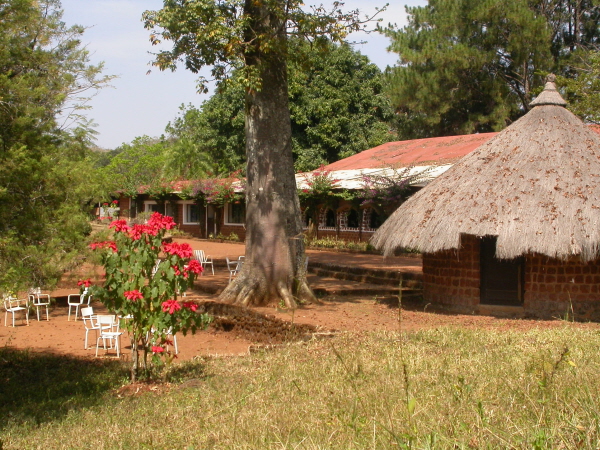
We were up with the sun, and birded the cattle ranch, where many birds are active. We soon spotted Scaly Francolins, among many others. Around 09.00, Benji spotted the bird we were looking for; the Ross’s Turaco, sitting in dense foliage at the edge of the lodge ground.
We returned to the ranch for breakfast, and then continued birding, but it soon got much too hot, so we returned to the lodge, where there was lots to be seen, just sitting in the shade with a beer and my binoculars.
In the late afternoon we returned to the cattle range, and soon saw a fantastic sight; a pair of Ross’s Turacos sitting in trees at the forest edge. Several Snowy-crowned Robin Chats also presented themselves to us. As it was getting dark, we went back to the lodge, where, luckily, the generator was now working.
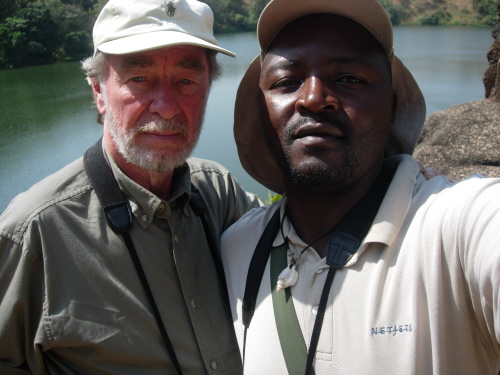
We arose at sunrise, and went birding at the Crater Lake, where we saw Kingfishers, Lapwings, Herons and many more but the best was a pair of Bearded Barbet. After breakfast we left and drove to Lake Tisot, also a Crater Lake, and we finally saw the
elusive Yellow-fronted Tinkerbird, which we had often heard around the lodge, but were never able to spot. I continued to be amazed at the total lack of waterfowl in such lakes, seeing only some roosting Little Egrets.
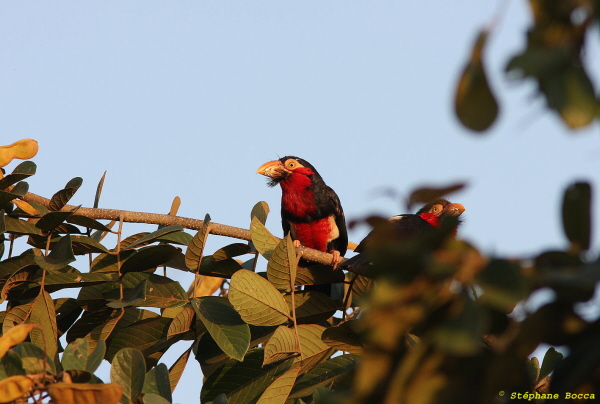
They also had a dinning room with excellent food and wine.
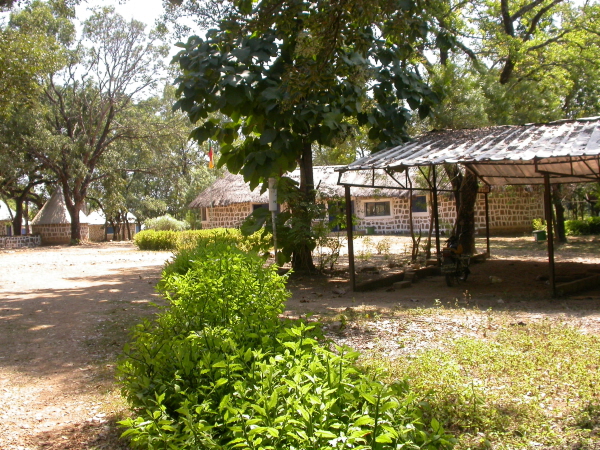
We got up early again and started off trying to find our guide and pay for him, so we could start birding. (Its funny how soon you get used to waiting, and maybe we in the western world could learn a few things about not being so aggressive when we do not get instant service). We found the right man, and we set off with the guide, walking down a trail behind our cottage toward the river.
There were lots of birds around, and we even heard the king of beasts sounding off in the savannah, and not too far away either. We arrived at the river bank, which was very wide and sandy, and we saw many tracks of both birds and animals. The Baboon group, which I had seen when we arrived yesterday, was gone, but there were plenty of Hippo tracks, so they must come this way at
night, when they feed. Luckily we did not run into any stragglers.
Again, there was no waterfowl, but a few shore birds, like Egyptian Plovers, Lapwings and lots of birds in the trees on the
river edge.
We returned to the encampment, and we had late breakfast and then drove down to the Hippo pond, birding on the way. First, a Black-bellied Bustard ran right across the road, as soon as we left. We also saw Francolins, large Lizards, Bush Duikers, and many birds on the way. At the pond I counted 18 Hippos taking it easy in the water or on the bank.
It was getting very hot, so we returned to the encampment for a rest until late afternoon, when we drove back along the road we came in on, to bird until it got dark.
In the dinning room there was a group of French volunteers, there to teach the park rangers basic computer skills. I met one of them, who turned out to be a Romanian computer engineer living in Paris. We had a nice dinner with a bottle of wine before we turned in for a good night’s sleep.
Nov 22nd.
We left early in the morning for the long drive to Waza and I tried to get our fearless driver, Alim, to slow down, so I would have a chance to spot some of the birds on the way. This was not an easy task with a Fulani driver, who didn’t understand why anyone would like to drive slowly. On the way out of the park, we saw more Francolins and Bustards, but also Buffalo, Antelopes and a large group of Baboons crossing the road in front of us.
We arrived at dusk at the encampment de Waza, after a long and exhausting drive. I was greeted by a very friendly resident Barn Owl sitting on a pole outside my room.
We were the only people there, except for four young armed white men in civilian clothes, who looked like mercenaries. When I asked one of them why they were armed, he told me there were bandits around, close to the Chad border. (I googgled the logo EUFOR on their vehicle when I returned home, and sure enough it was called the European Union Force, financed by EU) and who knows what they were doing in Cameroon?
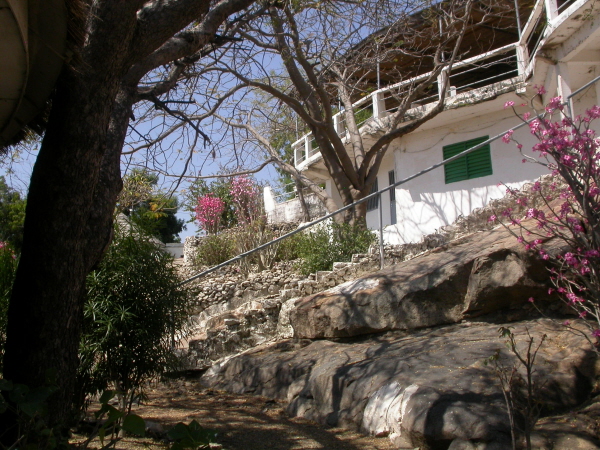
Because we lost a day to the strike, we only have half a day to bird Waza and that was definitely a mistake, since it was some
of the best birding so far.
As soon as I stepped outside at dawn, a large flock of Black Crowned Cranes landed in the marshes in front of the encampment. Many other birds were present, but I also saw a man tending his trap line, and who knows what he was catching.
The park entrance was right across the road from the encampment, and we picked up our guide and started to drive into the park. Alim, the driver, got a little upset when I told him to slow down, or I would take over the driving; then he started to drive very slowly.
Better too slow, than too fast, and we saw the many birds in the grassland. Upon arriving at the waterholes, there were even more: Waders, Francolins, Guineafowl etc.
Except for Antelopes, we did not see any large mammals, but there were plenty of tracks around the waterholes.
Around 11.00 it started to get very hot, with the sun right about our heads, and we had to return to the encampment to check
out. As soon as we got there, a commotion started, and one of the “mercenaries” killed a yellow snake for no reason, but at
least he used a stick and not his weapon.
After lunch we hit the road for Maroua where we will spend the night at Relaise Porte Mayo, a nice little hotel with plenty of hot water and good food.
Nov 24th.
After breakfast we set off for the long drive back to Ngaoundere, to catch the train back to Yaounde and Alim was happy again, because I told him he could drive fast. He was actually a pretty good and safe driver, but not much of a birder.
There were no problems with the train this time and we boarded through the chaos of people trying to get on.
Nov 25th.
I slept pretty well during the night, since I am used to Cameroonian trains now, and woke up at dawn. The landscape was again completely different to what we experienced in the Northern provinces. It was very green and lush, but the train is moving too fast to see any birds other than large ones.
Every time we stopped at a town, the train was surrounded by people (kids and women of all ages) selling fresh fruit, fried
fish, roasted grubs etc.
We arrived in Yaounde around 10.00 and fought our way out of the train just to stand and wait for the new driver, who was late because of heavy traffic.
Every time I visit a big city with its air pollution and traffic congestion, I hate cars and motorcycles even more. We fought
our way out, and headed for Buea, where we will stay the night.
This was the capital when the Germans ruled Cameroon, and one can still see their influence. It’s only an hour’s drive from Yaounde, with an elevation of about 1000m, so the temperature was quite pleasant.
It was a very busy market town and I took time to stroll around. Everything was for sale here, and I found a section where they sold used books and picked up a couple of children’s books to take home to Karen.
Buea is now an English-speaking town, with very active evangelical groups of all stripes conducting loud services around the clock. This was very different from the Muslim north we had just left.
When I returned to the hotel, one of the staff was sitting outside, and she asked me to buy her some gin. It’s a good thing I have Benji around to protect me from the Anne Marie’s of Cameroon, as we called them between ourselves.
We stayed at the OIC Pavilion, a fairly large and busy hotel. When I checked in to my room, there was no water in the bathroom. They did turn it on when asked, and I think the reason it was turned off was that every tap leaked badly.
Nov 26th.
We were up very early and off to Mount Cameroon, which turned out to be quite an experience. A taxi dropped us off at the road and we started to ascend the volcano.
Before I left, Karen suggested I should get myself a walking stock, and I reluctantly agreed (It’s only for old people you know) and bought a collapsible one. It was a very good thing I had it, or I may not have survived the climb.
As soon as we started walking up, a large German estate from the colonial times came into view, and it now belongs to President Biya, although he has never used it. Next we passed a cow lying on the road, dying. Then the local jail came into view.
There were no high walls or electrical fences to keep the inmates in. (I am sure they know exactly what will happen to them, if they run away). As soon as they spotted me they started to yell “Hi white man give us money for bread” and that was my first experience on Mount Cameroon.
We met up with David, our local guide and started to climb the trail, which was often fairly rough and steep. It was quite hot and humid and we had to carry sleeping bags and other personal items, since we would be spending the night on the volcano.
Trees and bushes were filled with birds and we saw Yellow-billed Turacos, Mountain Robin Chat, Black-winged Bishop and many more.
We arrived at the camp around noon, and rested for a couple of hours before we resumed the ascent towards the meadows, where we encountered a very noisy group of Yellow-billed Turacos and Mount Cameroon Francolins.
Upon returning to the camp, Benji and David prepared dinner in the cooking hut, and we dined al fresco, with candle light. As soon as it turned dark the forest was alive with sound, and the sky was very clear, allowing for a fantastic look at the planets and stars.
We bedded down in a common sleeping hut, on a simple bunk made out of planks. There were no doors or windows, but then there
were also no mosquitoes 2000m up.
Since the mountain was not a park, I am not sure who maintained the facilities and can’t say they were the greatest.
We came upon many clearings on the way up, where locals were subsistence farming and the constant sound of chainsaws all day
does not bode well for the future. On the other side, who are we to complain, when we destroyed most of the European and North American habitat centuries ago?
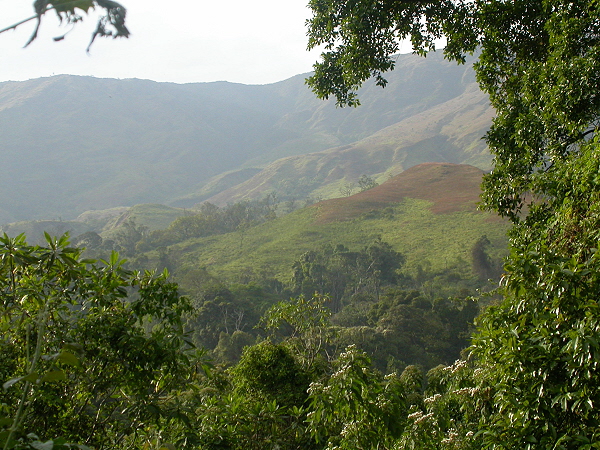
We were up with the sun and after a bit of breakfast we proceeded with the descent. Many parts of the trail were very rough, and there was a very real danger of falling, if you were not extremely careful. I barely made it, and even had to ask Benji to carry my knapsack most of the way. We did meet some old bird friends on the way down, but to tell the truth very little birding was possible.
We arrived back at the jail, and to my relief, a 4WD was waiting for us for the drive to Limbe. This was Benji’s hometown, so he slept at home and I checked in at the Miramar hotel, located on the shores of the Atlantic and very close to the Botanical Gardens.
In the evening I was invited for dinner at Benji’s house, where I met his wife and children (The youngest Nathan and I will always remember each other). Later on, we piled in to the car and went to a beach restaurant for a beer and malt for the kids.
Nov 28th.
I got up early to bird the Botanical Gardens (Giant Kingfisher, Sunbirds etc.), before we headed for Korup National Park.
The trip started badly, since we barely got out of Limbe before we were stopped at an army checkpoint.
The soldier told Jacob the papers for the car were not in order, and for the first and only time I have to show the certified photo copy of my passport and visa. The soldier asked for my yellow health card, but Benji told him it’s packed in my suitcase, and besides that, I could not have gotten a visa without it. He then lost interest in me and concentrated on Jacob’s papers.
A good half hour later, and who knows how much money he had to pay the officer in charge, and we are off again.
For the rest of the trip we got stopped several times and had to pay bribes, but Jacob took care of it, and as I told him, with his negotiation skills, maybe he should go back to school and study law, since he could be an excellent lawyer.
After lunch in Kumba we continued to Mundemba, a small village close to the park entrance. This turned out to be a horrible
drive because of the condition of the road, which was also very busy with many trucks. Not only were there mega potholes, but terrible red dust covered everything. It was difficult to understand how the many people living beside this road were willing to tolerate it. Everything was covered in red dust.
We booked into a small hotel, where we met an American couple from Wisconsin and their daughter, who was working as a volunteer at the wildlife center in Limbe. They had hired a boat to take them up to the park, but the pilot got lost, and they were
rescued by the Cameroonian navy; for a price, of course.
They were going to hire a “taxi” the next day to take them to Kumba. We told them about the road conditions, and suggested a
taxi would be not only horrible but also unreliable, and since our driver was free the next day, I suggested they could hire
him, which they did. We also had the first rain during the trip.
Nov 29th.
We got a bit of a late start, since there was nobody at the park office, where we had to pick up our permit and the guide and porter for the trek into Korup NP. That’s where cell phones came in handy, and they finally arrived and we are off.
Driving through endless palm nut plantations, we arrived at the entrance to the park. To enter we had to cross the river on a hanging foot bridge, and encountered a Giant Kingfisher as soon as we start the crossing.
It was hot and humid when we entered the forest and started the hike into the camp (7.4 km but that is in a straight line, and much longer following the trail).
Dennis the porter took off, and Julian, our guide, led us. After 20 minutes we came upon a large sign stating Prince Charles was here, but I think he knew something, I did not know, since he turned around and went back here.
The trail was fairly level but often crossed streams, where you had to jump from stone to stone, or, if you are lucky, balance on a giant tree trunk, acting as a bridge. A walking stick was definitely useful here too.
At one point, we came upon fresh signs of elephants having crossed the trail, but Julian ensured me there was no danger, since forest elephants were very shy and would not attack us. I am not sure about that, but except for the broken trees they have been feeding on, and fresh droppings, there was no sign of them.
Julian spotted a big black snake in a tree close to the trail and we could hear monkeys and many birds. It was densely forested, and therefore not easy to spot birds and animals here.
Around noon we arrived at the camp, and I was totally soaked from perspiration. Even my passport and the money I carried in a money belt were wet, making it necessary to dry them in the sun.
About 15.30 we got ready to trek into the Picathartes Knoll, hoping to see probably the most famous bird in Cameroon - the Grey-necked Picathartes or Grey-necked Rockfowl, found no where else in the world but here. After a good hour’s trek we arrived
at the knoll, made of huge rocks the size of small houses (Some catastrophic eruption must have created it millions of years
ago) leaning up against each other, forming a “cave”, where this strange forest bird built a nest looking like a large swallow’s nest.
Upon finding two new nests, Julian thought there was a good chance we would see the birds, and we settled in to wait for them.
It was hot and humid and it started to rain and nothing happened. Around 17.30 Julian got up, and told me to follow him and be very quiet. We crawled in under the overhang of a large rock and I envisioned snakes and other creatures crawling over me. Then the birds arrived, so close we did not need binoculars to see them.
Moving back to the "cave", we saw more Picathhares coming in and counted seven, but I think there were more.
It was now after 18.00 and we decided to trek back to the camp, hoping to get there before it was completely dark. When we arrived at the camp, I was totally exhausted and decided to skip dinner and just sleep. I woke up several times during the night to the forest sound of countless animals and insects.
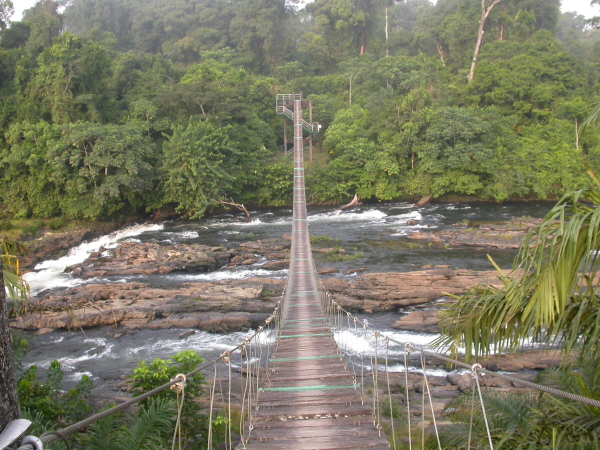
Waking up with the sun I felt much better, and Julian and the porter were preparing breakfast. Benji told me they were somewhat worried about me and kept a close eye on me all night. I think it was a combination of exhaustion and de-hydration last night. Nothing some water and a good night’s sleep could not cure.
We packed up and started the hike back to the bridge. The porter had the biggest pack, but he soon left us behind, even though
he was bare-footed.
About 2/3 of the way along, he came running back, very exited, and told us he came upon a large python laying on the trail, but when we got there, there was no sign of this big snake.
Since we have found the bird we came to see, we were in a bit of a hurry to get back and meet Jacob, who was waiting for us at the bridge to take us to Mount Kupe.
Again we suffered the terrible road to Kumba and much of the way to Nyassoso was not much better.
We arrived at the women's centre just as it was getting dark, no one knows anything about our accommodations, and everything was locked up.
Well it's Africa, and I could not get too excited; besides I was sure Benji would somehow manage the situation. A woman from one of the houses nearby came over, asking if she could help, and she contacted a lady who worked for the center. When Judith arrived, she informed us that nobody told her anything about us, even though Benji had phoned several times to make sure we had
a place to sleep and some food. Judith was very efficient and made arrangements for us to stay at the only local hotel (not
quite finished yet), but we had our own room with bath, whereas, in the women's center, we would have been sleeping in a dormitory. She also opened the kitchen at the center and cooked a nice hot meal for us, but I had to drink warm beer, since that was all they could find in the village. During dinner, a young German missionary suddenly showed up, saying he had been informed there were foreign visitors in town. I tried to tell him we were here to go birdwatching, but he was only interested in telling us about his missionary work to save the local souls.
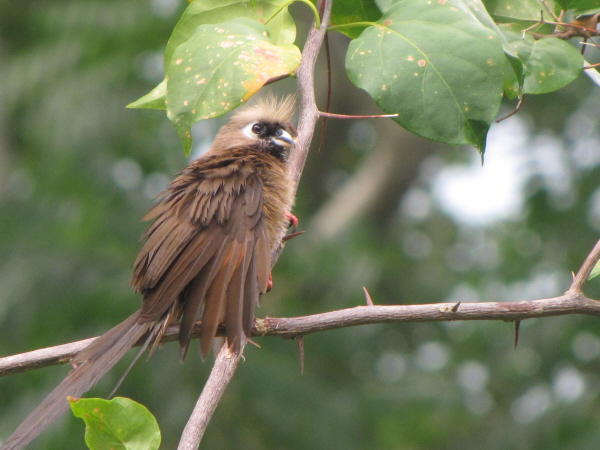
Last night I decided to skip the Bakossi Mountains, which we had planned to visit today.
There was a problem with the tribal chiefs and this meant we couldn’t get to Kodmin, where most birders want to go, in order to find the Mount Kupe Bush-shrike, but maybe next time. The local chief had some problems with a fine he could not pay, and he was suspended by the villagers and a new chief was selected, resulting in visitors having to supply liquor and food to the village, and then not one but two local guides to “protect” us. There would be no problem if we hired two guides plus the additional cost to buy liquor and a pig, and if there had been a couple of extra days in my trip, I would probably put up with it, since the birding was very good here and the Shrike was fairly easy to find.
After an early morning start, we met Peter, our local guide, at the school, where the trail started. This was a steep and often overgrown trail, but there were many birds early in the morning: Green Turaco, Chestnut Wattle-eye, Black-shoulderd Puffback, to name a few.
Around ten, everything got quiet and we decided to start the trip back. When we arrived at the hotel Jacob had a small problem. He had decided to wash the car and something happened to the rear window and he could not close the back door.
Benji and I went down to the women's center for breakfast, and when we returned it was not a small problem anymore.
After a couple of hours it was kind of fixed, and we took off, heading for Bamenda. This was not a pleasant trip, without the rear window on a Cameroonian dust road, and we arrived after dark. I was not very comfortable driving at night because drunk driving was common, making it dangerous.
We checked into the Ayaba Hotel: the first place with an elevator and all the modern facilities.
Dec 02nd.
We got up early to drive to Awing to see Bannerman's Turaco. We barely got out of Bamenda before the car engine started to overheat, and we had to stop several times, adding water to the radiator, and lost a lot of time. Jacob managed to get us to Awing. The birding was excellent here and, it was easy walking, but it was too late for the Bannerman's. At the lake we spotted two Little Grebes some of the few waterfowl we saw during the whole trip.
We returned to the hotel in Bamenda, and I had lunch with Benji's father, Lawrence, a retired teacher and farmer from a nearby village. Having grown up in Cameroon, when it was still an English colony, we had a very interesting conversation about the many changes that have happened in his country during his life. Having a chance to meet local people, and listen to their experiences and opinions has always fascinated me, and Birdingpal has been an excellent source of many of these conversations over the years.
I spent the afternoon at the hotel pool reading a book, and minding my own business, when I had a funny experience with some young students. The leader, (a big talker named Ivan), asked me what a foreigner like me was doing exploring his country. I told him I was not exploring, but just a visitor enjoying the beautiful birds in his country. It did not impress him too much, and he became quite aggressive, so I went and found Benji, who was a very big man. The kid did not see me coming back and he was a bit surprised to see me again, and have me introduce him as a top professional tennis player (as he had told me he was earlier) to my Cameroonian friend. Just then a female Splendid Sunbird landed in a bush near us, and when I pointed it out to Ivan, who seemed to know everything, and asked him what kind of bird is that, he looked and told us it was just a "Grassbird". This made not only Benji and me laugh, but all his buddies too, embarrassing him to no end. I think it will be some time before he makes fun of an old foreigner again.
Dec 03rd.
Today we left early to drive to Kribi, located on the Atlantic coast, cutting across from Bamenda, and driving mainly on logging roads. It was a long drive and because of road conditions, we have to drive slowly. After a 12 hour drive we arrived after dark, but at least the last 100 km was on good road with little traffic.
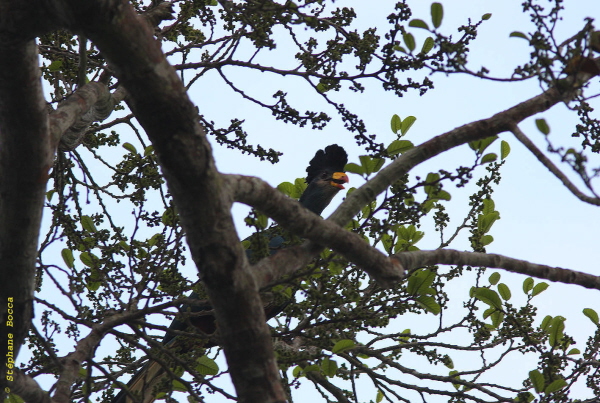
We checked into a small beach hotel and enjoyed a fresh fish dinner al fresco, overlooking the ocean, before retiring after a long day.
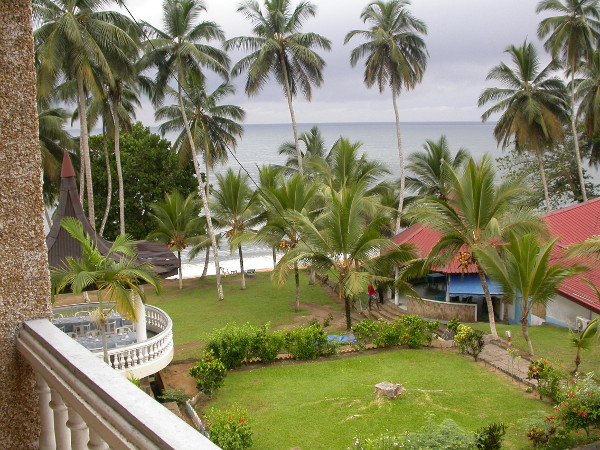
I go up at dawn and walked down to the beach, and I was still amazed that, except for a few shore birds, there were no gulls or other sea birds to see. I have birded the Atlantic shores in Europe, North and South America and there have always been plenty of birds to see. Not here, maybe because of the season, but there were lots of birds in and around the hotel grounds. This was a day of leisure, with a late breakfast, and later we drove south, doing a bit of birding in the afternoon.
Back at the hotel I had an excellent grilled Langouste dinner, with a nice bottle of wine which I enjoyed very much, even if Benji complained about the price. In general, a good French table wine was available anywhere for a reasonable price, but this hotel only had two bottles of white wine, and I drank the first one the night before. Now I understand why the waiter kept the other bottle for the day after, because there was no other choice. Anyway, one only live once, as I told Benji, and he liked the expensive wine too.
Dec 05th.
Today we were leaving to drive to Limbe, a short pleasant trip I thought. The roads were good and we took our time birding on
the way until we reached Duala.
On the main road into the city, there was a huge market, with stands on both sides of the road, and I do not think there was
much you could not buy there.
Lots of people and traffic made it a bit of a nightmare, and then we got stopped at a check point again, and not police, gendarmes, or soldiers. This time it was the local township out making a little extra money, and they were the most expensive
and unfriendly ones we met during the whole trip. Anyway, Jacob got us through again, after a lot of wasted time, but he was not too happy.
Driving through Duala we reached the road to Limbe, which was under construction and the traffic jam and air pollution were horrendous. We wasted more than an hour again. Arriving in Limbe I checked into the Miramere Hotel. The hotel restaurant was right on the shore, and I went down to a gazebo where Constance served me a cool beer and wanted to know what I had experienced since my last stay here. I was not sure she really believed that we trekked into the forest, climbed volcanoes and met elephants and pythons on the way. It started to rain quite heavily, as it had done on and off all day, when a Woodland Kingfisher landed
in a small tree maybe 3 meters from me. We looked at each other until I finished my beer, and he got tired of looking at me and flew away.
Benji and Jacob picked me up late afternoon and we drove north, with the ocean on one side, and Mount Cameroon on the other
side. You could still see the effects after the last eruption, and the beaches were black sand.
This was my last night before I left Cameroon, and Benji has called ahead to the restaurant, arranging for a pork dinner
tonight. It was not bad, but when it comes to meat, they just cook it too much here in Cameroon. Fish dishes were excellent
(both fresh and salt water). In the French areas, the bread was very good, but not so much in the English part - and why am I
not surprised? I remember, when I first immigrated to English Canada 50 years ago, the “airmail bread” was awful until I found a real baker.
Dec 06th.
I got up early, and had a nice long walk in the Botanical gardens, but missed out on the resident Giant Kingfisher this morning.
Benji arrived for breakfast and brought me a little gift: Cameroonian coffee and honey. They were very much appreciated, as I enjoy both regularly.
I packed my things, and, after a pleasant lunch at a restaurant looking down and out over the ocean, we hit the road for Duala. It was still a bit of a nightmare getting through the construction but I am delivered to the airport for my flight home and
Benji made sure I was off safely before he left to go to a wedding.
Waiting for departure, I stuck up a conversation with a German professor who had spent a couple of weeks advising the government on how to protect the forest from being completely destroyed. I hope he was successful. It would be a shame if this beautiful country became nothing more than plantations growing palm nuts to make fuel for cars.
It was a long flight back to Canada, where I arrived the next day to snow and freezing weather.
Knud Rasmussen
Birdingpal
There are still plenty of wild places left in Cameroon but you may want to visit here for a little birdwatching before it is too late. This is an article I read in The Post Online Cameroon you may be interested in.
Illegal Forest Exploitation Is High In Cameroon.
By WWF Director Kini Nsom.
Despite the current efforts by the World Wide Fund for Nature, WWF, to stem the tides of illegal logging and unscrupulous
hunting of wild animals in Cameroon, WWF Country Director, Dr. Martin Chamba, says the phenomenon remains high.
Unscrupulous timber exploiters deplete Cameroon's rich forests "We have won some battles in the war for environmental and wildlife protection. We are yet to win the war," Dr. Chamba told journalists in a press briefing in Yaounde over the weekend.
He said after 20 years of its existence in Cameroon, WWF is facing full-fledged mutations, mapping out new strategies to tackle its challenges in conservation. He said the organization was taking new network initiatives to continue to conserve nature for the good of mankind. To him, the WWF initiative would be concentrated more in Cameroon, Gabon, Equatorial Guinea, the DRC, Congo Brazzaville and the Central African Republic. WWF will hinge its activities in priorities areas, taking into consideration the local realities.
Thus, WFF aims at working with the various stakeholders to mainstream the fight against the illegal exploitation of flora and fauna and environmental degradation in national policies. Dr. Chamba said it is unfortunate that Cameroon's Poverty Reduction Strategy Paper, PRSP, presses for more exploitation of forest and environmental resources but makes no provisions for conservation. To him, government ought to have taken conservation issues into account.
The outfit is also initiating durable funding. It intends to create a trust fund that will ensure the payment of environmental services. This would mean using the debt relief mechanism to lobby in such a way that some of the money from debt cancellation should be put in a special fund for the payment of environmental services. He said, for instance, that the people of Kumba
should be compensated for preserving Lake Barombi. He said the initiative holds that a company like the Cameroon Water Corporation, CAMWATER, should reward the people of Kumba for protecting the lake and saving the ecological integrity of the place.
According to Dr. Chamba, WWF will intensify partnership with the private sector to improve environmental governance. This means liaising with MPs and civil society organizations to influence a change in policy.
The WWF boss regretted that the rate of illegal wildlife exploitation in Cameroon has continued to soar. He said illegal hunting and the illegal trafficking of wildlife species is still the order of the day in Cameroon. WWF, going by him, is initiating a win-win situation where special hunting zones will be organized.
Dr. Chamba revealed that only three logging companies have hearkened to the policy of certification. He said WWF will work hard to make sure that at least 10 forest exploitation companies bow to certification.
The WWF boss said they will map out programs to lobby with mineral exploitation and road construction companies not to trample
on the environment while executing the projects.
This is what WWF must be doing, Dr. Chamba stated, to preserve biodiversity in the Congo Basin forest that is the second largest tropical forest after Ambazonia. Over 60 million people live in the Congo Basin forest area that covers a surface area of 180 million hectares. 70 percent of the populations depend directly or indirectly on the forest for survival. That is why the onslaught for conservation has been an uphill task to the conservation body.